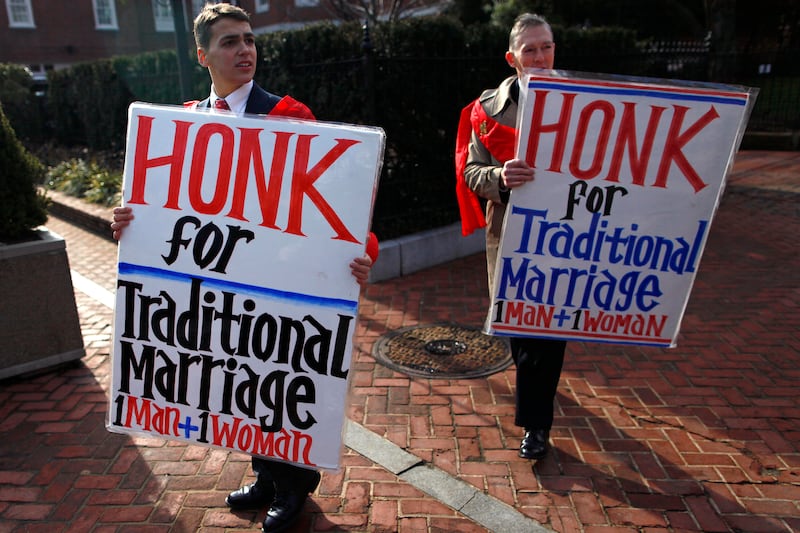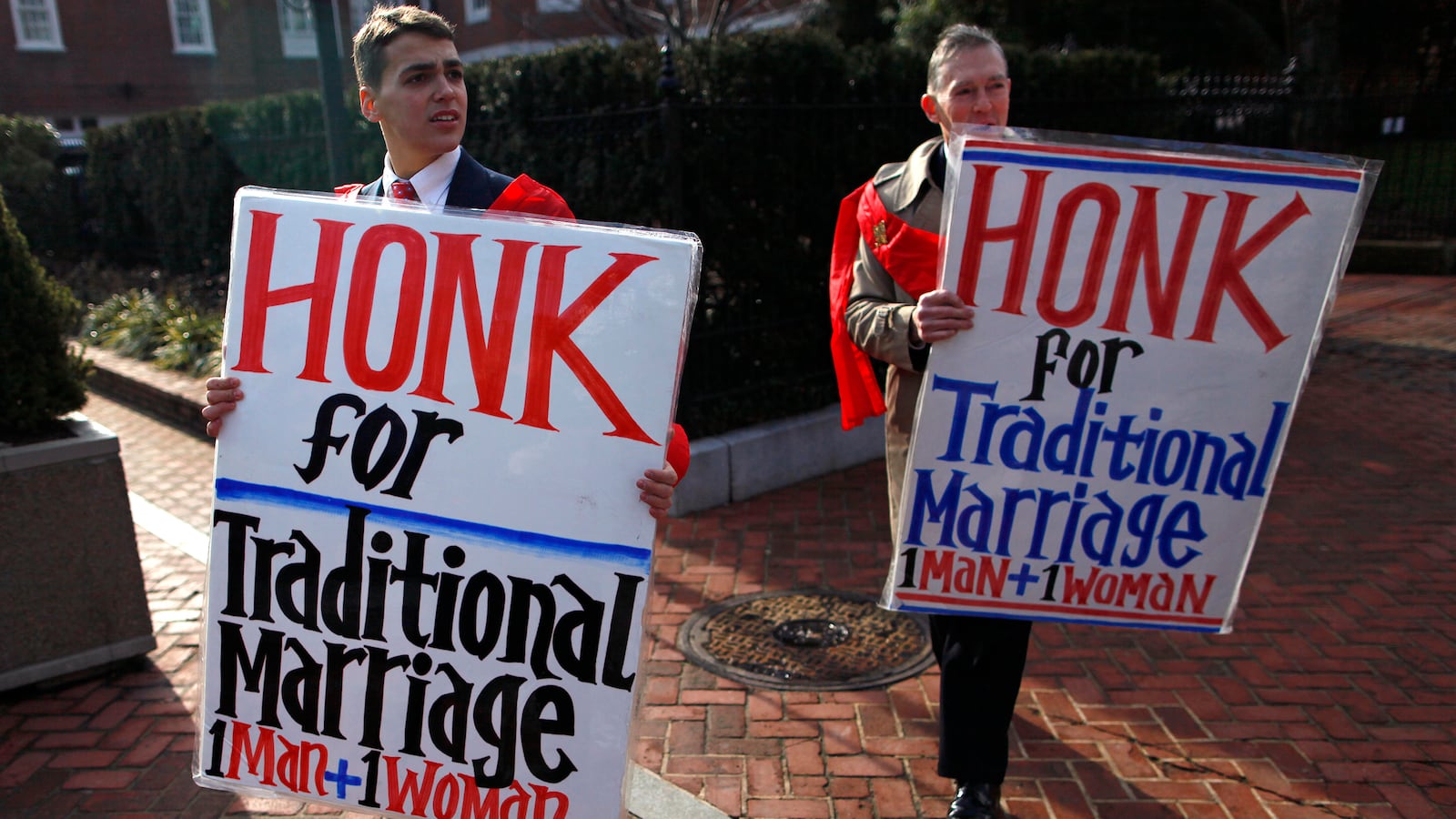Can you hear the piteous weeping? The wronged tears? Those poor bigots are under attack. Those who are prejudiced against gay people are having their constitutional right to say so trampled. It’s a terrible injustice: you can’t believe that gay people are lesser without some pesky homosexual objecting and “bullying” you into believing that equality under the law is a venerable aim.

And so is heralded the latest trope in the saga of former Mozilla CEO Brendan Eich, who resigned after the controversy around his giving donations to a 2008 Proposition 8 campaign to retain a ban on gay marriage in California. Eich is now apparently the victim of an army of gay rights “fanatics,” rainbow pitchforks in hand, coursing across the land, seeking to quell any resistance to their sinister agenda that, ummm, gay people should be treated just like everyone else.
Even gay conservatives and contrarians are circling, licking their chops. In Andrew Sullivan’s reading of the Eich brouhaha, the former CEO has been severely wronged. His piece on the subject is headlined, “The Hounding of a Heretic,” as if there is something heroically counter-insurgent about someone who doesn’t believe gay people should be accorded legal equality.
“Will he now be forced to walk through the streets in shame? Why not the stocks?” asked Sullivan. “The whole episode disgusts me—as it should disgust anyone interested in a tolerant and diverse society. If this is the gay rights movement today—hounding our opponents with a fanaticism more like the religious right than anyone else—then count me out. If we are about intimidating the free speech of others, we are no better than the anti-gay bullies who came before us.”
This stirring rhetoric has a few canards at its heart. Most obviously, “the anti-gay bullies who came before us” exercised the reins of power, either directly or indirectly. The “anti-gay bullies who came before us,” directly and indirectly fostered vicious prejudice, and created laws and disseminated fear accordingly. Today, when we call out homophobia, we may do so concertedly, but it is set squarely to correct injustice and inequality, not maintain it.
Gays did not “hound” Eich from his job. He gave money to a group seeking to obstruct equality for gay people. Years later, he got a high-profile job at Mozilla, a tech company in a professional community noted for its progressiveness. Naturally enough his background and beliefs were researched and his donation to the Prop 8 group was exposed. Inevitably, some people objected to that. Then he and Mozilla clearly came to a decision about his position with the company.
Why shouldn’t he have the right to those beliefs, say Eich’s defenders. Of course he has the right to them. He is also a high-profile public figure, and those who object to his beliefs have a right to state their objections.
Gay people didn’t hound Eich from his job. Eich resigned presumably because he and his company figured the bad publicity they were getting from this, and the financial knock-on on their business, would be adversely affected by the revelation of his Prop 8 donation.
While Mozilla went out of its way to emphasize its belief in inclusivity this week, Eich did not. Mozilla made the decision to fire Eich, gay people did not. The volubility of gay activists isn’t the point here, it’s the immense shift in corporate culture that means even a whiff of homophobia can be bad for business.
While there is nothing to celebrate in somebody losing their job, we should be celebrating that we have reached a time where homophobia is being questioned and challenged. Instead—please laugh or cry at this point—people bitch about their right to be homophobic being constrained.
This conflation of the bully-turned-to-victim neatly clouds the admirable baseline mainstream America is edging towards: the “shame” axis around homosexuality has positively shifted from those who are gay to those who are anti-gay.
Perhaps those conservatives bemoaning the fate of Eich will take a moment to consider the gay men and women, and those who are transgendered, who have lost jobs or been discriminated against because of their sexuality and sexual identity in the workplace. There is an almost laughable irony observing their defense of Eich’s homophobia, set against the inability of our policymakers to pass ENDA, the Employment Non-Discrimination Act, into law.
After years of discriminating against gay people, after turning a blind eye to the violence inflicted upon them, to the inequality foisted upon them; after doing all they could to ensure all those bulwarks of prejudice remained firmly in place, the conservative right wing has decided the only remaining course of action is to play the victim.
The last argument that the opponents of equality are attempting to drive is an exhausted one: that gays are too loud, too demanding. Enough already. The right wing’s traditional anti-gay arguments—that homosexuality isn’t normal, that gay people are family-destroying freaks—now seem, to a broad mass of voters, what they always seemed to gay people: dangerous, insidious nonsense. A judge in Michigan stated that their arguments against marriage equality were irrational and absurd.
Now that the law, belatedly and slowly, is beginning to treat gay people as equal citizens, the only recourse opponents have is that they—the real bullies—are themselves being bullied. Of course, “bullying” is an over-used word, an overplayed accusation, and it is most galling when used by those who know historically how to wear their knuckledusters with pride. Most recently, Michele Bachmann claimed gays had “bullied” the American people and politicians.
The sad thing is to see this misnomer being promulgated by gays themselves. How does Sullivan, when he bemoans the activists who got on Mozilla’s case, think the strides towards equality were achieved in the first place? Long before the suits of the Human Rights Campaign got involved, change was demanded by gay men and women furious that their civil rights were being disrespected, most famously crystallized on the night of the Stonewall Riots.
A quite natural, absolutely correct anger—think of Reagan’s shameful AIDS ignorance—underpins gay activism. Equality is now so long overdue, yet still elusive, that anger inevitably flares when an example like Eich and Mozilla presents itself. Eich’s lack of personal response to the controversy exacerbated the anger.
Eich is not a brave “heretic.” His prejudiced views are simply not those a company like Mozilla wants to be associated with. Eich wasn’t badgered or bullied from his job. He was shamed out of it. And the shame wasn’t his, it seems because he’s had very little to say about the matter—but rather his employer’s. All of this is ugly, for sure. But a belief in, and practice of, equality is not. If we aspire to that personally and legislate for it publicly, the ugliness will dissipate.





